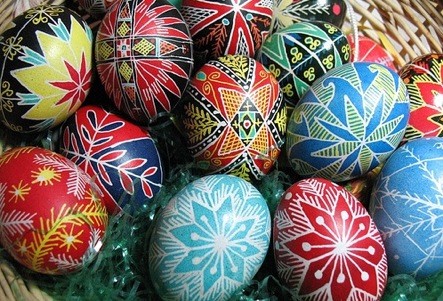(单词翻译:单击)
中英文本
Easter
复活节
Easter is a time of springtime festivals. The Easter we celebrate today is a combination of different traditions. Partly, it comes from old festivals to celebrate Spring. And partly it comes from the Christian celebration of the rebirth of Jesus Christ.
复活节是春季的节日。当今世人所庆祝的复活节实际上融合了多种古老的传统。它一部分来自古老的迎春佳节,一部分源于基督徒纪念耶稣基督复活的仪式。
Most people agree that the word "Easter" comes from the Anglo-Saxon Goddess Eastre, a symbol of Spring. It is easy to see how "Eastre time" bacame "Easter time".
多数人认为“复活节”一次源于盎格鲁萨克逊人所信奉的女神EASTRE,她是春天的象征。这样,就不难理解“女神EASTRE的节日”如何演变为现今的“EASTER”一词了。

As a chief Christian festival, Easter is celebrated on the first Sunday after the first full moon after the 1st day of Spring. It can be as early as March 22, or as late as April 25! Many dates of the Christian calendar are dependent on Easter. The celebrations of Easter have many customs and legends that have nothing to do with Christianity. Of all the symbols associated with Easter, the eggs, the symbol of richness and new life, is the most important.
复活节是重要的基督教节日,每年春分(3月21日)过后,第一次月圆后的第一个星期日就是复活节。它的具体时间可早在3月22日,亦可晚至4月25日。基督教教历的许多重要日子都与复活节的具体日期有关。复活节节庆活动的许多习俗与传说都与基督教无关。
The customs and traditions of using egge have been associated with Easter for centuries. Originally, Easter eggs were painted with bright colors to represent the sunlight of spring and were used in Easter-egg rolling contests or given as gifts. After they were colored and printed with various designs, the eggs were exchanged by loves and romantic admirers. In the Middle Ages, eggs were traditionally given at Easter to the servants. In Germany, eggs were given to children along with other Easter gifts.
在所有与复活节有关的象征性事物中,复活节彩蛋最为重要,它象征着富饶与新生。涉及彩蛋的习俗与传统成为复活节节庆活动的组成部分,已有数百年的历史。起初,复活节彩蛋被涂上鲜艳的色彩,象征春天的阳光,并被用于滚彩蛋比赛或作为馈赠的礼物。恋人们和迷恋浪漫的人们将彩蛋涂上色彩并绘成各式图案后相互交换。中世纪,主人习惯在复活节将彩蛋赐予仆人。在德国,大人们将彩蛋连同其他复活节礼物一起送给孩子们。
重点讲解
1.a time of ...时期
例句:It was a time of agitation and revolt.
这是一个动荡不安,反抗四起的时期。
2.a combination of ...的结合;二者合一
例句:The family's reaction was always a combination of shock and joy.
那全家人的反应总是惊喜交集。
3.have nothing to do with 与...无关
例句:You had better have nothing to do with him.
你最好不要跟他交往。
4.associated with 与...有关;与...有联系
例句:He is associated with his sons in business.
他和他的儿子们合伙做生意。


